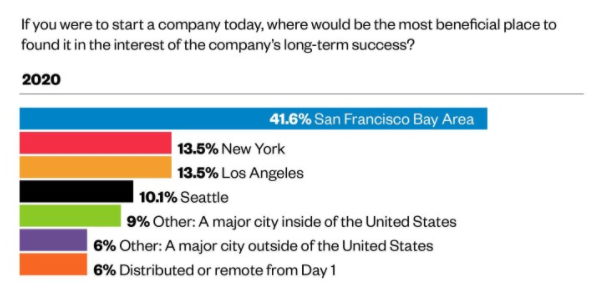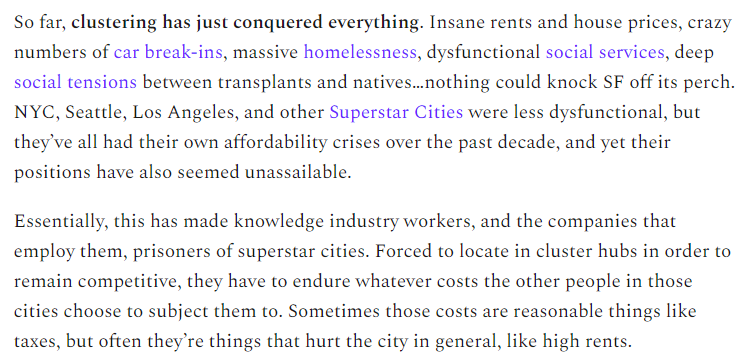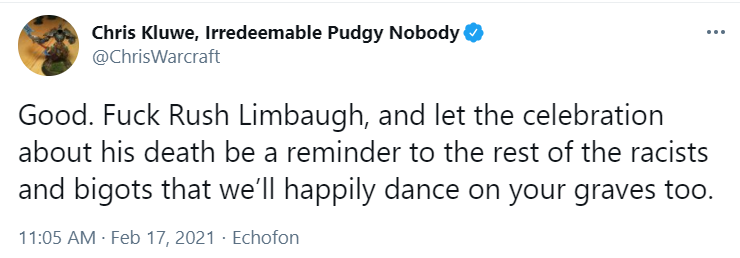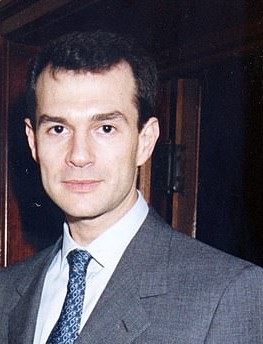Remember: Just because an idea is old doesn't mean it's good.
More from Noah Smith
Today and tomorrow we'll be having a Bloomberg Ideas event!
— Noah Smith (@Noahpinion) October 25, 2018
Today will be a panel on cryptocurrency.
Tomorrow will be panels on the economics of AI, and on regulation of big tech companies.
You can watch livestreams here:https://t.co/1dC0ELGvabhttps://t.co/Juz5Mp2EC1 pic.twitter.com/VfxOscNflo
Our first panel is about cryptocurrency! We have @matt_levine, @tylercowen, @eiaine, @nirkaissar, and Camilla
Ou: Crypto will be useful for the unbanked.
Cowen: Crypto has to compete against a bunch of other emerging payments technologies. Bitcoin is too inflexible.
Cowen: I'll bet on the payments companies over crypto.
Some are predicting a shift to remote work and distributed companies.
Let's take a hard look at what that would actually
2/We're all familiar with the trend of tech companies and other knowledge industries (finance, biotech, etc.) piling into a few tech hubs, raising rents and house prices.
Now some think the advent of Zoom, Slack, etc. might reverse this trend.
https://t.co/nQVCJrKvrB

3/But escaping the superstar cities is going to be tough.
The forces keeping tech companies in places like SF are so strong that these regions have essentially become prisons for these companies.

4/In order to escape the prison of the superstar cities, tech companies and other knowledge industries will have to overcome the Four Jailers of Industrial Clustering:
1. In-person office productivity
2. Thick market effects
3. Knowledge spillovers
4. City life amenities
5/I'm actually pretty optimistic that companies can find ways to make remote work productive.
Studies show that working from home *some* of the time actually tends to raise
More from Society
https://t.co/eXLNam2gv4

Good. Fuck Rush Limbaugh, and let the celebration about his death be a reminder to the rest of the racists and bigots that we\u2019ll happily dance on your graves too.
— Chris Kluwe, Irredeemable Pudgy Nobody (@ChrisWarcraft) February 17, 2021
Here again is a summary of the Christian Abolitionists’ arguments against enslavers’ appeals to the Scripture: Thread
Slavery is not a sin. It is never outlawed by the Bible. Manstealing is but not slavery.
— micah (@laborersarefew) February 20, 2021
Murdering babies and sodomy are sins according the the Bible. YOU don't get to make up things as you go Dolly, neither do I or Malachi.
You May Also Like
Covering one of the most unique set ups: Extended moves & Reversal plays
Time for a 🧵 to learn the above from @iManasArora
What qualifies for an extended move?
30-40% move in just 5-6 days is one example of extended move
How Manas used this info to book
The stock exploded & went up as much as 63% from my price.
— Manas Arora (@iManasArora) June 22, 2020
Closed my position entirely today!#BroTip pic.twitter.com/CRbQh3kvMM
Post that the plight of the
What an extended (away from averages) move looks like!!
— Manas Arora (@iManasArora) June 24, 2020
If you don't learn to sell into strength, be ready to give away the majority of your gains.#GLENMARK pic.twitter.com/5DsRTUaGO2
Example 2: Booking profits when the stock is extended from 10WMA
10WMA =
#HIKAL
— Manas Arora (@iManasArora) July 2, 2021
Closed remaining at 560
Reason: It is 40+% from 10wma. Super extended
Total revenue: 11R * 0.25 (size) = 2.75% on portfolio
Trade closed pic.twitter.com/YDDvhz8swT
Another hack to identify extended move in a stock:
Too many green days!
Read
When you see 15 green weeks in a row, that's the end of the move. *Extended*
— Manas Arora (@iManasArora) August 26, 2019
Simple price action analysis.#Seamecltd https://t.co/gR9xzgeb9K














